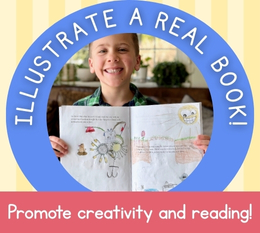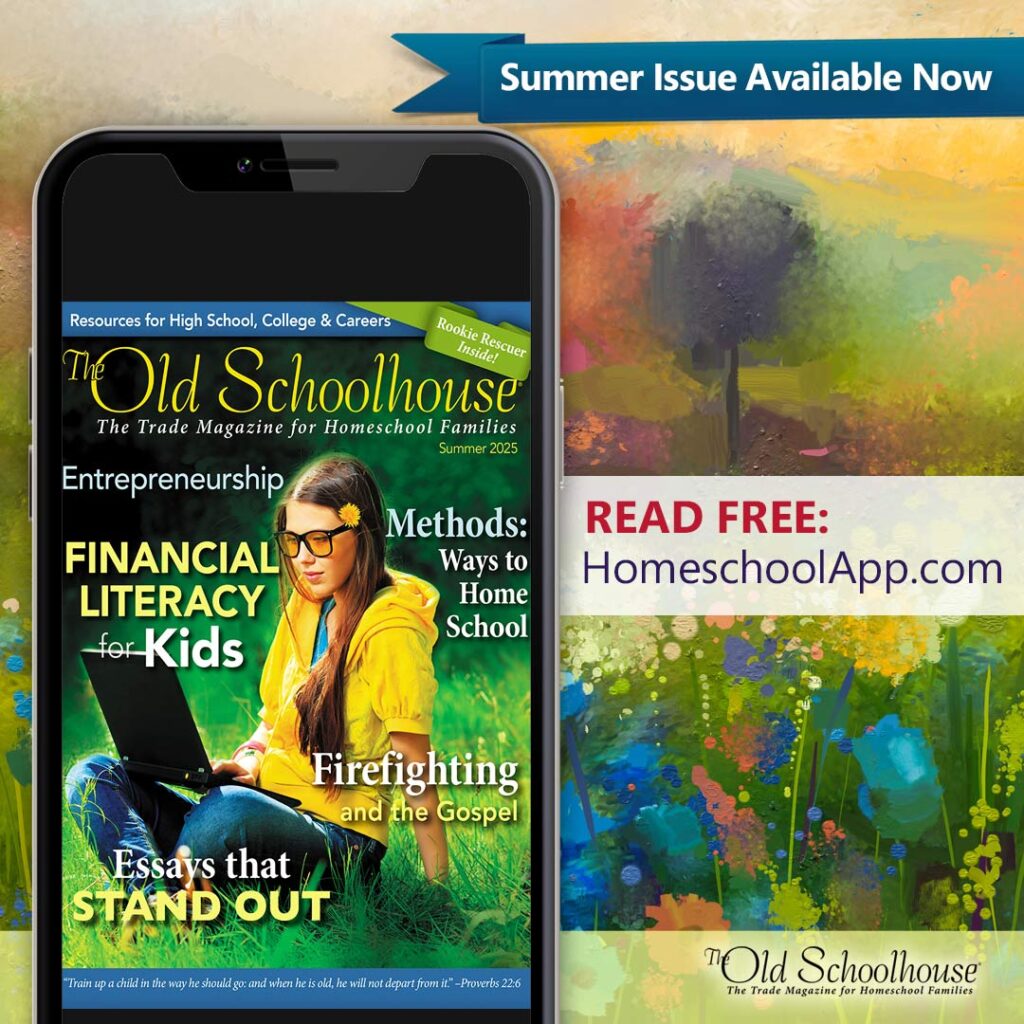The Old Schoolhouse® Product & Curriculum Reviews
With so many products available we often need a little help in making our curriculum choices. The Old Schoolhouse® Magazine family understands because we are in the same boat! Do you need more information on a product before you buy? With over 5,500 products listed in 52 easy-to-use categories, much of the information you need to know is only a click away! Let our reviewer-families help yours.
The Eternal Argument (Book and Audiobook Available) Review by Rebecca Ray and Christy Schaefer
R. Robin FinleyAnalytical Grammar
919-783-0795
7615 Vista Del Rey Lane
Raleigh, NC 27613
http://www.analyticalgrammar.com
Imagine that you can put every book or piece of literature that you have read into one framework. In fact, they are all a part of the same long, on-going conversation. That is the premise that author Robin Finley begins her book The Eternal Argument with. In this book, Finley takes the view of the history of literature as one long argument between two opposing parties, with a back-and-forth swinging pendulum between each end of the argument.
When I received this audiobook in the mail, I immediately popped the first disk into my car’s CD player and began to listen carefully. There are eight disks in this unabridged audiobook, and the author reads the book. There are fifteen chapters, and the book retails on Analytical Grammar’s website for $24.95. I listened to this book over the course of about two weeks with my husband and older two children who are eleven and nine as we drove around town to Tae Kwon Do Practice, to run errands and to accomplish the other multitude of daily tasks in our lives.
Finley begins by explaining a crisis that she went through where she began to wonder, “Why do we read all these books?” As it happened, she was still in college at the time, and she had a professor who explained something that really changed her view on literature and the purpose behind studying “all these books.” This something was an argument between theists and humanists about the nature of God, whether he exists, whether we have a sin nature, and how we were going to solve the problems of all humanity.
As Finley explains in her book, the concept is much deeper than what I’m explaining here, but this visualization gave Finley purpose to her reading, and a basic framework to hang each book that she read and taught onto. Finley goes on to discuss power, the platform and legs that western literature is built upon, and whether or not we should quarantine our children from literature from multiple points of view. Then, Finley takes the next five chapters to discuss the history of Western literature as a part of her proposed framework. She closes with additional information to help teach literature and applies the ideas in her book to the books that she examines in-depth throughout the book.
I really loved getting to experience this book, and my husband and children also discussed the ideas in this book with enthusiasm. It also exposed the children to the ideas behind some books they had not heard of yet, and made them interested in reading some of the classic works that Finley analyzes. Despite the fact that this is not a curriculum, this would be an excellent foundation for a history of Western literature course for an eighth or ninth grader. It would give them a framework for further high school and college literature study.
I also really liked the idea of the argument throughout history in our literature, and as Finley described it, I could see it clearly. Having an audiobook version allowed me to expose the whole family to a book and to ideas that they would not have been opening to listening to if I had announced this book as an upcoming read-aloud. The only problem with having the audiobook version is that I’d like to listen to it again and pause the book frequently to take notes.
I highly recommend this book for both family discussion and for literature and history study. I plan to go through this book more in-depth with my children as they grow into high school age and can engage with this book on a deeper level.
-Product review by Rebecca Ray, The Old Schoolhouse® Magazine, LLC, June, 2016
And another review of the physical book:
Do you ever wonder how literature instructors know how to pull the deeper meaning from literary works? Either to instruct students yourself or for the simple enjoyment of seeing more than a basic plot in well written books, it's beneficial to have an understanding of literary framework. Robin Finley, the author of Analytical Grammar, has put down in a book titled The Eternal Argument her thoughts on comprehending literature gleaned from 34 years of teaching experience.
The purpose of The Eternal Argument is to explain how the author's interpretation of the underlying theme of Western literature and culture functions as a framework to view all Western literature. She calls this framework the Eternal Argument. It is her hope that having framework with which to view writing will help us all to understand and relate to literature in a more personal manner.
Mrs. Finley designed the book to be read aloud as a family, or at least as a parent and their student child. Given this intention, the book is structured into chapters that each have a set of discussion questions over the main theme of the preceding chapter. The questions are not simple information regurgitation, but instead expect the reader to apply the ideas presented in thoughtful responses.
The author contends that because we as a culture like to talk about ourselves, you can see a common thread through most of Western literature. That thread is our Eternal Argument, or what we struggle to comprehend about ourselves and our world. She views the main themes of the Eternal Argument to be:
- Is there a God or not?
- Are we flawed and need God or are we alone and decide right from wrong ourselves?
After quite a bit of discussion about the use of the overarching Eternal Argument in literature, the book goes on to demonstrate the how to place information into this framework. There are several chapters that progress through a summary of western culture history while breaking down specific eras for the reader. Ancients to the Middle Ages, the Renaissance to Neoclassicism, the American and French revolutions, the Romantics to the Realists, and the Naturalists to the Modernists are all explained through the lens of the author's Eternal Argument framework.
After practice using the framework on history, the book turns to literature by beginning with a summary of literary vocabulary before providing specific examples of using the Eternal Argument in literary works. Finally, there are sections directed at both classroom teachers and parents / homeschool teachers which set out guidelines for teaching literature.
My early high school aged daughter and I began reading The Eternal Argument together, as intended by the author. Fairly early on my daughter lost all interest, since it does take several chapters to get past the author's explanations of an Eternal Argument. While this style of writing will be suited to people who thrive on details, my daughter prefers more concise writing. We also found it hard to determine who the true intended audience of the book might be. At times it felt like the book was speaking to a student, where other passages felt like they should be skipped during read-aloud time and read privately by the teacher.
The Eternal Argument does put forth fascinating ideas that may indeed help a young reader come to a deeper understanding of Western literary works. And while I personally found the book to be an interesting read, I'm not sure I entirely agree with the author on all points. The book was still definitely worth my time.
-Product review by Christy Schaefer, The Old Schoolhouse® Magazine, LLC, June, 2016
Do you want to get the word out about your product or service to the homeschool community? Email the TOS Advertising & Sales Director, and share a little about what you´d like showcased, and we can help with that! Also, check out the magazine’s media kit and rate card at www.Homeschool.Market.

















































